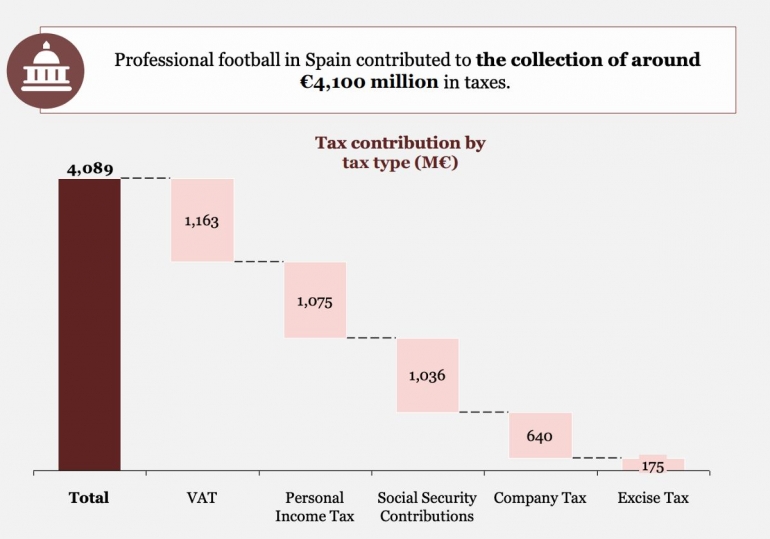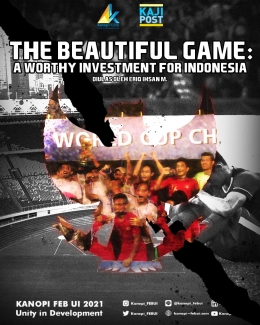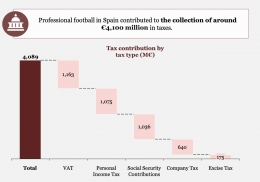The Beautiful Game: A Worthy Investment For Indonesia
The year 2022 started with a defeat in the AFF Suzuki Cup final for Indonesia, yet the aftermath of this tournament felt different. In past defeats, the performances had simply been below bar, however this time round there was a youthful and positive spirit surrounding the camp. Many star players for the national team, such as Ricky Kambuaya, Ramai Rumakiek and Pratama Arhan, were encouraged by pundits and commentators to take the big step abroad, whilst fans pleaded with head coach Shin Tae-yong on social media to continue in his role, even though his contract still runs until 2023. Nevertheless, the overall situation is still particularly dire, as the country currently sits in 164th position in the FIFA rankings, below the likes of Burundi, Afghanistan and regional rivals Singapore.
Although Indonesian football has not experienced much success, it does have a rich football history. Competing as the Dutch East Indies, Indonesia were the first Asian team to qualify for the World Cup finals. The country has also qualified for the Asian Cup a respectable four times and has finished runners-up of the AFF Suzuki Cup a record six times, albeit never winning the competition itself. Thus, the Southeast Asian nation has been coined a 'sleeping giant' by many, demonstrating the huge potential that it has to reap the rewards of further investment in the football industry.
Significant Economic Incentive
With a huge consumer base, Indonesia has the capability to capitalise on the large domestic market. With a population of 270 million, the sprawling archipelago has a population larger than the UK, Spain, Germany and Italy combined. The four respective countries mentioned are home to the top four leagues in Europe, based on the 2021 UEFA club coefficient rankings. In the 2019-2020 season, the English Premier League alone contributed a total of 7.6 billion to the UK economy, despite one quarter of the football season being played behind closed doors due to the COVID-19 pandemic (Walker, 2021). In addition, the Premier League supported 100,000 jobs in 2016-17, providing vital support to local communities across the country, due to the significant investment in the top-flight of English football (Ernst & Young 8).

Figure 1, Source: PricewaterhouseCoopers
Aside from the English Premier League, the economic benefits from football can be seen in other countries as well. As per the 2016-2017 football season, a report from PWC found that football contributed at least 1% of GDP in all regions in Spain apart from one, with five communities generating over 1 billion per year. It can be seen that the football industry is able to attract tourists, provide jobs and spur on economic growth. The report found that the football industry in Spain has created around 185,000 jobs.
As shown in Figure 1, it has also enabled the government to receive around 4.1 billion in taxes, which is equal to 1.37% of the total national GDP (La Liga, 2019). Furthermore, in the 2018-2019 football season, PWC were able to establish that FC Barcelona alone created economic activity which translated into 1.191 million in Gross Domestic Product, which is around 1.46% of the total GDP of the city, approximately 19,500 jobs and a significant tax revenue of 366 million (FC Barcelona, 2020). In a separate analysis, it was found that two of the most well-known clubs in Spain, Real Madrid and FC Barcelona, when combined generate more revenue than the GDP of 14 different countries (Forjanes, 2020). Stadium tours to the historic Santiago Bernabu Stadium and the Camp Nou were shown to have attracted more tourists than Ecuador.
Recently, Indonesian football has seen external investment from notable celebrities and businessmen. Well-known figures such as Kaesang Pangarep, Atta Hallilintar, Garibaldi Thohir and Raffi Ahmad have become shareholders of Persis Solo, AHHA PSG Patti, Dewa United and RANS Cilegon FC respectively, achieving relative success in a short space of time on and off the field. However, the Indonesian football league system is still far off in terms of quality compared to other Asian counterparts, like Japan, Korea and China, let alone Europe. In order for Indonesia to reap similar economic benefits, supporting football clubs across the country should be considered a priority. This can be done by improving the management of the football pyramid as a whole and creating a suitable climate for investment. The potential returns of a well-structured football system coupled with additional investment are expected to be particularly significant, especially with the unique fan culture from throughout the country.
Political Influence
In recent years, a number of developing countries have decided to invest heavily in football, with arguably the most noteworthy being China and Qatar. Many commentators and analysts have observed that the motivation of these countries has not only been on-field success, but also an increased influence on the global stage. Since the turn of the second millennium, state-backed companies ranging from Gazprom, Qatar Airways and Visit Rwanda have all sponsored football clubs. Even the flag-carrier of Indonesia, Garuda Indonesia, has become a sponsor of one of the most successful English Premier League teams, Liverpool Football Club. There is increased incentive for governments and businesspeople to invest in football, as it offers the opportunity of recognition to the mass market. Being the owner of a football club or sponsoring the team would result in a significant leap in exposure, whilst even sponsoring and partnering with individual players can also help increase recognition.
Ergo, football clubs can be regarded as suitable communication channels and media platforms, promoting not only the football-related affairs, but also the commercial and oftentimes closely intertwined political interests in an effective and more classy manner. In 2008, the Emirati government decided to invest in English football club Manchester City, transforming the club into a European football powerhouse, whilst simultaneously becoming an ambassador for the Emirati state. During that time, the stadium, originally known as the City of Manchester Stadium, was renamed as the Etihad Stadium. In addition, Etihad Airways, the national airline of the United Arab Emirates, became the main shirt sponsor. A similar process took place in France, with the acquisition of French Ligue 1 outfit, Paris-Saint Germain, by Qatar Sports Investments, a subsidiary of the Qatar Investment Authority, the sovereign-wealth fund of Qatar.
Although there have been Indonesians investing in football clubs abroad, it has occurred due to the interests of individuals. Erick Thohir, Aburizal Bakrie and Lukito Wanandi are a few Indonesian people that have had stakes in foreign football clubs, purchasing Italian club Inter Milan, Australian club Brisbane Roar and English club Tranmere Rovers. Though the acquisitions made by these respective businesspeople are positive steps, in order for a more sustained effort by Indonesia as a whole to achieve success both on and off the pitch, efforts must also come from the highest echelons of government. The Indonesian government should look to encourage more businessmen to invest in football abroad, by making football a key industry in its economic development plan, or invest through its own state-backed institutions, such as the Indonesian Investment Authority. Only through that will Indonesia be able to expand its influence and increase the soft power it has across the world.
A Healthier and More Prosperous Population
A study conducted by the English Football Association also showed that increased investment in football brings significant health benefits to the population, as playing regular grassroots football saves the UK National Health Service 43.5m per year through reduced GP visits alone (Kitson, 2019). Ergo, increased investment in grassroots football in Indonesia could help reduce some strain on the currently stretched healthcare system. Whilst Indonesia has adopted a universal healthcare system, the government has had to keep supporting it with additional funds, as it has consistently experienced a deficit due to many people using its services (Akhlas, 2020).
In addition, football also provides positive role models for many young people, especially those who come from underprivileged backgrounds and communities. Many football players came from disadvantaged communities, such as Cristiano Ronaldo and Mohamed Salah, which provides many people of similar backgrounds to become inspired by their success stories. As of 2019, Indonesia has a HDI of 0.718 (United Nations, 2019), showing that there are still many disadvantaged communities throughout the country. Thus, football can become an outlet for many young people to strive for a better future, provided that the government decides to invest greater resources into the industry.
Moving Forward
The potential of the football industry in Indonesia is clear to see for all. Not only would all citizens unite in dreaming of the prospect of seeing Indonesia at the World Cup, but the benefits for the development of the country as a whole are also significant. The vast archipelago is the fourth most populous nation and is filled with football fanatics across the country, meaning a successful football industry would have a multiplier effect on many sectors of the economy and on the development of the country as a whole. With further investment and political support, success in the Indonesian football industry can happen, and it should happen.
References
Walker, Charlie. "Premier League Contributed 7.6 Billion to the UK Economy in the 2019-20 Season." Daily Mail Online, Associated Newspapers, 16 June 2021.
Ernst & Young Global Limited, Economic and Social Impact, 2019.
La Liga. "Revealed: Football's Economic Impact Stretches across All Parts of Spain." Global Ftbol, 2019.
FC Barcelona. "FC Barcelona Contributes 1,191 Million Euros to the Wealth of the City in 2018/19." Official FC Barcelona Website, 12 Feb. 2020.
Forjanes, Carlos. "Real Madrid and Bara Generate More Revenue than 14 Countries." AS.com, AS En, 1 Mar. 2020.
Akhlas, Adrian Wail. "No More Funds Available to Cover BPJS Deficit, Says Sri Mulyani." The Jakarta Post, 8 Jan. 2020.
Kitson, Michael, The Social and Economic Value of Adult Grassroots Football in England, The English Football Association, Jul. 2019.
United Nations Development Report. "Human Development Reports." Human Development Reports, 2019,












